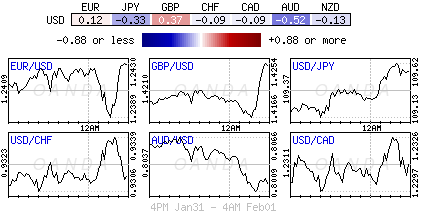Thursday February 1: Five Things Markets Are Talking About
Global equities have kicked off the new month mostly in the ‘black’ as capital market participants have decided that the outlook for growth and corporate earnings remains strong enough to suppress concerns about the back up in sovereign yields.
US Treasuries have resumed their slide, while the ‘mighty’ US dollar trades steady against G10 currency pairs.
Yesterday, as expected, the Fed held the overnight interest rate target range steady between +1.25 – 1.50% in a unanimous vote (9-0). In their accompanying statement, policy makers noted that the US labor market had continued to strengthen and they dropped the language on expecting inflation to remain below +2% in near-term. In fact, the statement made few changes from December and affirmed a solid outlook for US. growth. It offered little sign that officials’ thinking about the economy has changed materially.
Note: Next up is tomorrow’s US non-farm payroll report (NFP), where US employers are supposed to have added more jobs in January than a month earlier (+180k vs. +148k).
1. Stocks get the green light
In Japan, the Nikkei share average rallied overnight, rebounding from a six-day losing streak and pushed most sectors into positive territory, as a weaker yen and upbeat corporate earnings drove the benchmark index higher. The Nikkei rose +1.7%, while the broader Topix jumped +1.8%.
Down-under, Australian shares rose overnight, supported by strong gains in mining stocks and financials. The S&P/ASX 200 index climbed +0.9%. In S. Korea, the KOSPI index dropped -0.05%.
In Hong Kong, shares weaken as energy and finance stocks fall. At close of trade, the Hang Seng index was down -0.75%, while the Hang Seng China Enterprise (CEI) index fell -0.94%.
In China, equities were also under pressure, as investors dumped firms, which are expected to report weaker 2017 earnings, and took profits ahead of the upcoming long Lunar New Year holidays. At the close, the Shanghai Composite index was down -0.99% losing ground for the fourth consecutive session. The blue-chip CSI 300 index was down -0.71%.
Note: Data overnight showed that growth in China’s manufacturing sector remained solid last month, beating market expectations, as new business led factories to raise output at the start of 2018.
In Europe, regional indices trade higher across the board and in tandem with US futures, as corporate earnings support the move higher.
US stocks are set to open in the ‘black’ (+0.2%).
Indices: STOXX 600 +0.4% at 397.1, FTSE +0.1% at 7540, DAX +0.4% at 13237, CAC 40 +0.5% at 5507,IBEX 35 +0.5% at 10507, FTSE MIB +0.9% at 23717, SMI +0.4% at 9376, S&P 500 Futures +0.2%
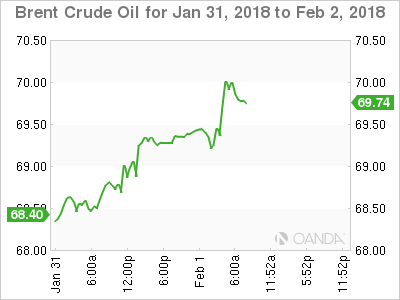
2. Oil rises as OPEC compliance trumps US output, gold lower
Oil is better bid after a survey showed OPEC’s commitment to its supply cuts remains in place, even as US production topped +10m bpd for the first time in 48-years.
Brent crude futures are up +49c at +$69.38 a barrel, while WTI crude for March delivery rose +45c to +$65.18 a barrel.
Note: Brent crude rallied +3.3% in January – it was the strongest start to a New Year for five-years.
The week’s EIA report showed the biggest increase in crude oil stocks in 11-months, a rise of +6.8m barrels.
For crude bears, they now have to gauge how much US production will increase as prices rise.
Ahead of the US open, gold prices are under pressure after the Fed left interest rates unchanged, but hinted at hikes later this year. The market would also prefer to take his cues from tomorrow’s US payrolls report. Spot gold is down -0.4% at +$1,339.71 per ounce. Yesterday, it touched +$1,332.30 an ounce, its lowest print since Jan. 23.
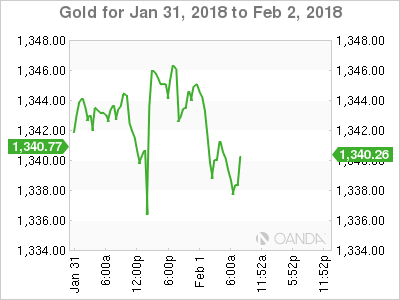
3. Sovereign yields continue to back up
Yesterday’s FOMC meeting was the last attended by Chair Janet Yellen before she turns over the reins to her successor, Fed Governor Jerome Powell.
Governor Powell will begin his term as chairman on Saturday, and is scheduled to be sworn-in as chairman of the Fed board of governors on Monday.
With the Fed’s three hike ‘dot-plot,’ the odds for a rate increase at the March 20-21 meeting remains at around +78%.
However, yesterday’s FOMC statement hinted that officials might favor more than three-rate increases this year because it offered slightly more conviction that inflation would move higher in 2018.
The yield on US 10-year Treasuries has backed up +3 bps to +2.73%, the highest in almost four-years. In Germany, the 10-year Bund yield has climbed +2 bps to +0.72%, the highest in more than two-years, while the U.K’s 10-year Gilt yield has advanced to +1.525%, its highest yield in 21-months.
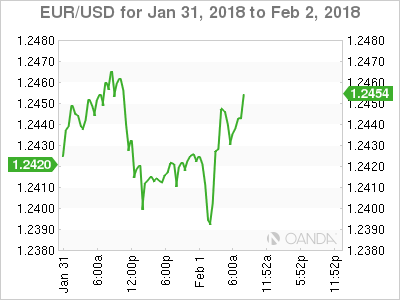
4. Dollar support remains lukewarm
The USD has ebbed and flowed in the overnight session on market belief that yesterday’s Fed ‘hawkish hold’ has very much been priced-in.
EUR/USD (€1.2433) is back above the psychological €1.24 handle as Euro manufacturing PMIs this morning support the region’s recovery story.
Note: Beats: France, Swiss, Norway, Czech; misses: Germany, U.K, Spain, Sweden, Poland and in-line: Euro-Zone and Russia.
The single unit is also getting some passive support that Eurozone inflation data may have bottomed.
GBP is higher by +0.5% at £1.4245, atop of its strongest level in 19-months, supported by the markets optimism on Brexit talks. Some fixed income dealers are bringing forward their forecast for the next Bank of England (BoE) rate hike to May. It’s conditional on a Brexit transitional agreement next month.
USD/JPY (¥109.73) trades at its overnight highs, underpinned by the Fed’s ‘hawkish-hold’ statement. The pair seems to be locked in a ¥107-110 range.
And following a horrid January for crypto currencies, Bitcoin (BTC) has again edged lower, trading below the psychological $10,000, down-6% at $9,605.
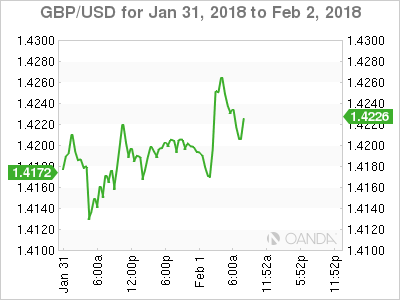
5. U.K manufacturing growth slows
Data this morning revealed an unexpected drop in January U.K manufacturing PMI to a seven-month low of 55.3, down from 56.2 in December and below the market consensus for 56.5.
Digging deeper, Markit (which compiles the survey) said that the reading remained “well above its long-run average of 51.7” and still showed a strengthening in new export order inflows.
Today’s report also revealed a sharp rise in inflationary pressures, with purchase prices rising at the fastest rate in 11-months.
